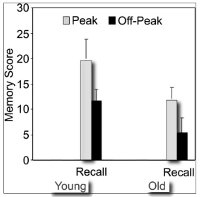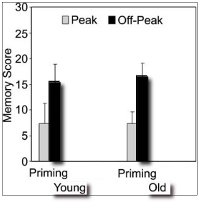|
The
results of a recent scientific study indicate that by the time you reach the
age of ~65, your ability to remember drops to 50-60%1 of an 18 year old. But
you
face increasing demands for more memory capacity each year. A long uphill
journey!

Remarkably, the results also indicate that when being reminded at a later time,
you can recall information with your subconscious memory but subconscious memory does not decay with age.2

Similar conclusion were published by R. N. Shepard in 19673, who studied how age
affects human's ability to recall vs. to recognize. The study indicated that the
recognition ability ages far better than the recall ability.
To harvest the power of your subconscious
mind (or the recognition memory), you need to be cued with a reminder; a form of
memory priming in psychological terminologyis best to remind you?
Friends, spouse, secretary or co-workers? For most people, the best person is
yourself.
The secret of overcoming memory decline is therefore, to build reminders at the moment we encounter something to remember, the foundation of the INFOMATO concept.
INFOMATO's patented technology can handle the unstructured nature of your human
memory.
Since INFOMATO software does not forget and is able to self-organize while draw complex associations faster and better than human memory,
it can effectively boost
your long term memory by 10 - 100x.
1 As indicated by the data in above first graph, 40 - 50% drop in
recall memory when compare the "young" and "old" groups.
2 As indicated by the data in above second graph, remarkably the "old" group has
a slightly better sub-concious (impression) memory than the "younger group."
3 "Recognition Memory for Words, Sentences and Pictures," Journal of Verbal Learning and Verbal behavior 6 (1967):156-63. "Your Memory," by Dr. Kenneth L. Higbee.
|